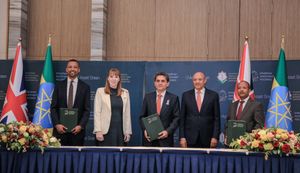Thailand's economic forecast for 2024 has taken a hit, with projections indicating growth of just 2.5%, down from last year's 2.0%. This forecast, released by the National Economic and Social Development Council (NESDC), reflects mounting concerns about the nation's slow recovery post-COVID-19, particularly among key industrial sectors.
Issaret Ratanadilok na Phuket, Vice President of the Federation of Thai Industries, voiced worries about the lackluster growth rates and the urgent need for economic reform. "Thailand has seen low GDP growth of just 1-2% over the past few years," Issaret explained. "We should avoid falling back on old tactics and lacking the courage to reform our economic structure." This sentiment strikes at the heart of Thailand's current economic philosophy—a plea for bold changes amid continuing global economic fluctuations.
Particularly alarming is the slowdown of Thailand’s automotive industry, which experienced a staggering 21% decrease. Such declines have contributed to the reduced Gross Domestic Product (GDP) growth forecasts, leading to calls for substantial restructuring of its economic policies. While exports saw some moderate growth, the overall picture painted by the NESDC remains troubling.
The economic forecast for 2024 indicated not only the expected growth but also suggested consumer spending should ideally rise by 3.3%, and private investment should increase by 3.2%. Yet these figures rest on shaky ground, as other ASEAN economies showcase stronger recoveries and growth potential.
To combat these issues, Issaret has proposed several strategies aimed at revitalizing the economy. These include consumer support measures to alleviate debt burdens and optimize expenditure. "Consumption support strategies should include debt relief and appropriate interest policies, ensuring SMEs can access funding and market competition is promoted," he stated, highlighting the importance of empowering small and medium enterprises.
Investment was another focal point of Issaret's recommendations. He urged the government to prioritize investments within sectors where the country holds competitive advantages, particularly agriculture and automotive parts manufacturing. "Investment must focus on industries where Thailand has strengths, such as processed agriculture and automotive parts," he emphasized, indicating directions for future government policy. These recommendations point toward embracing high-value products rather than pursuing lower-value primary goods.
A significant recommendation also included government spending directed toward infrastructure investments and local product promotion over reliance on imports. He noted, "Government spending should prioritize infrastructure and supporting local products more than imports," pushing for locally produced goods to receive greater attention as Thailand aims for self-sufficiency and resilience against external economic shocks.
Lastly, Issaret stressed the need to not only focus on current local consumption but also broaden Thailand's export capabilities. "Efforts to expand exports and attract new markets are key to overcoming existing economic challenges," he argued, portraying the global market as ripe for Thai goods with appropriate government intervention.
With these strategies laid out, the Federation of Thai Industries and other stakeholders aim to work closely with government entities. The proposed paradigm shifts seek to navigate through the current economic challenges and establish stronger foundations for sustainable growth.
Issaret concludes with optimism about the potential for collaborative efforts to revitalize Thailand's economy, stating: "I am confident all sectors are ready to work closely and proactively with the government to push Thailand through this economic crisis together." The call for extensive dialogue and action reflects the urgency felt within Thailand's economic planning circles.



